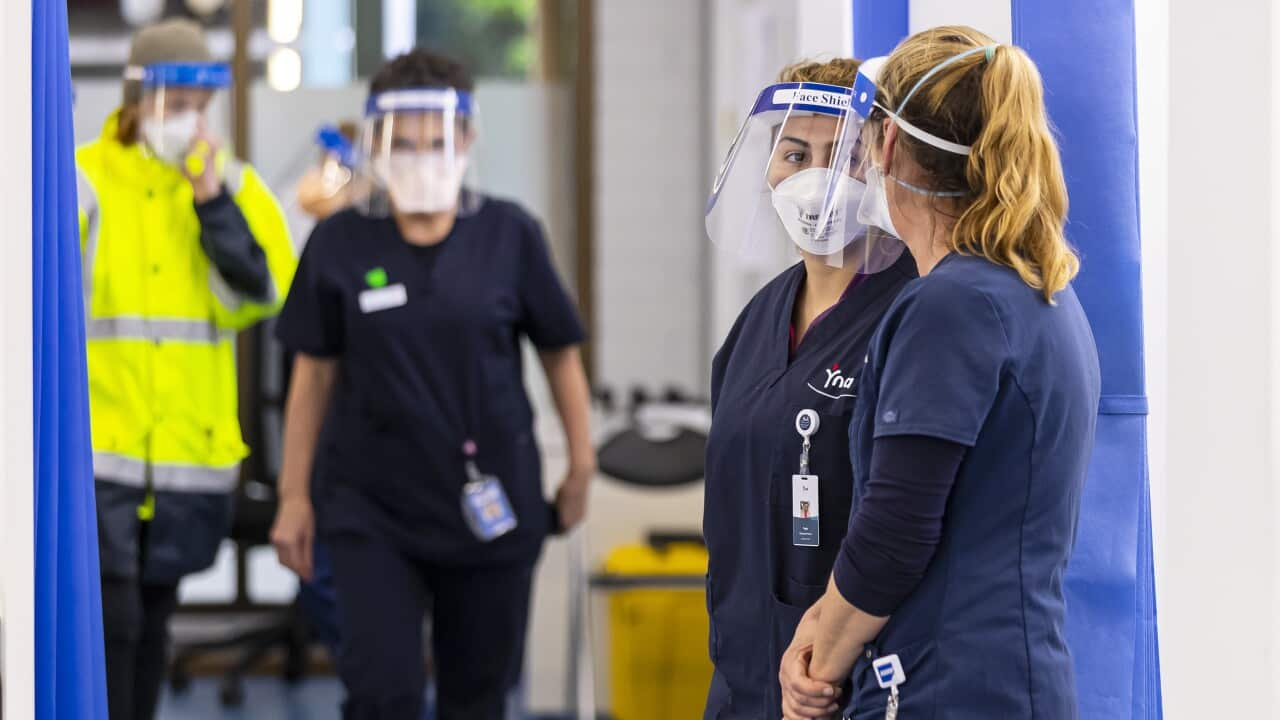Key Points
- Workers are being encouraged to work from home during latest Omicron wave
- In the absence of government mandates, employers must make directives
Claire (not her real name) works for a local government agency in Melbourne. She says she is “sick with worry” about having to work in her office during this third Omicron wave.
The senior administrative worker says while 95 per cent of the 200 people who work in her office effectively worked from home throughout much of 2020 and 2021, management does not currently allow for staff to work from home unless they provide specific medical advice relating to their individual situation.
Employers like the local government that Claire works for are being urged by the Australian Council of Trade Unions (ACTU) where possible.
ACTU Assistant Secretary Liam O’Brien told SBS News that in order to protect our hospital system and support frontline workers, “the least we can do is work from home where we can.”
“We know a third of workers can work from home and indeed, many people want to work either some significant part of their job from home, we think employers should be reasonable and accommodating,” he said.
While working from home was the norm throughout many parts of Australia throughout the first two years of the pandemic, government restrictions driving this eased throughout the end of 2021 and the start of 2022.
Claire said she went through “an incredibly stressful, and humiliating process,” where she had to provide medical documentation about her disability that leaves her immunocompromised, in order to be able to work from home this year.
But that arrangement had a time frame on it and she is expected to return to working from her office next month.
Claire said she takes precautions to reduce her risk of catching COVID-19 outside of work and is not advocating for a return to lockdowns, but wants to be able to also reduce that risk in her work environment as she is worried about what the long-term implications for her health could be if she contracts the virus.
“COVID has ripped through my department in the last two weeks, so most of the area, about 70 odd people have had COVID,” Claire said.
“A lot of people that I've spoken to have said there are no safety or health measures in place because the organisation’s stance is they won’t because there aren't any government mandates, they won't put anything in place unless they're required to,” she said.

COVID-19 can spread between people when gathering together in enclosed places. Source: Getty / Shannon Fagan/Getty Images
Claire has been in her role for a decade and says up until this year, she’s loved her job.
“This year has been soul-destroying because I feel that my health and safety, and the health and safety of everyone there is not being valued,” she said.
Mr O’Brien said the pandemic has busted a lot of myths about work.
“The one that I think is most profound is the fact that workers can be just as productive working from home as they can from working from the office,” he said.
Mr O’Brien said working from home may not be for everyone but where possible, people should be given the option.
“We think employers should look to sort of hybrid models that make working from home possible, it’s good for them, it's good for workers, it reduces travel time increases productivity, and something that we can all benefit from,” he said.
The Finance Sector Union hopes to formalise the right to negotiate work-from-home arrangements in upcoming enterprise agreements with major banks.
Finance Sector Union VicTas State Secretary Nicole McPherson said aside from government mandates, employers have an obligation to provide a safe and healthy worksite for all of their employees "and with increasing case numbers and increasing hospitalisations, our view is that the safest place for them to work is going to be from home".
She said in the agreements being worked on with banks they are trying entrench one of the good things that has come out of the pandemic into the working life.
"So that people can continue to have that flexibility of their work location even after the pandemic ends."


